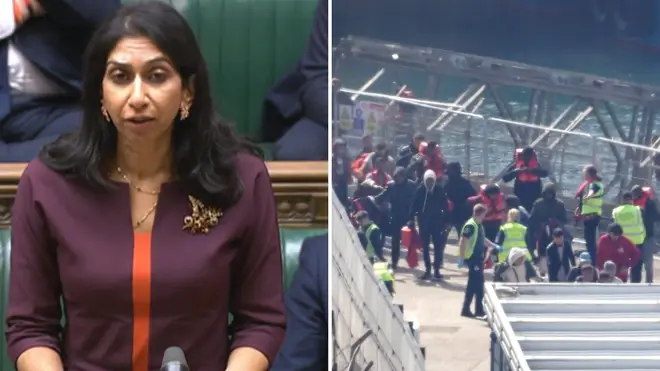
Clive Bull 1am - 4am
31 May 2023, 07:47 | Updated: 31 May 2023, 07:49

Civil servants at the Home Office are threatening strikes over the Government’s controversial Rwanda migrant plan.
The Public and Commercial Services union (PCS) that represents workers at the Home Office and Border Force, has said 'demoralised' staff face being forced to break the law - and they could explore industrial action.
Not a single migrant has been deported under the Rwanda plan due to legal challenges.
The PCS’s head of bargaining, Paul O’Connor, told the Independent: “There will be no stomach amongst our members for implementing the Rwanda deal and Illegal Migration Bill, and they will inevitably come to their trade union to see if there is recourse to stop it happening.
“If any litigation fails, they will want to explore with us whether there's an industrial solution.”
Labour accuses Sunak of being 'slippery' over order to hand over Boris Johnson Covid WhatsApps
Listen and subscribe to Unprecedented: Inside Downing Street on Global Player
It comes as 'significant failings' were identified in the UK asylum system, with The United Nations' refugee agency warning that officials were being forced to do "too much, too quickly, and with inadequate training".
The UNHCR said it had either seen or been informed about "numerous risks to the welfare of asylum-seekers", with trafficking cases overlooked and victims of torture being detained.
The comprehensive audit of the system praised Home Office staff for their work under difficult conditions, but said that corners were being cut and workloads were unsustainable.
"The current registration and screening systems expect staff to do too much, too quickly, and with inadequate training, facilities, guidance and oversight. As a result, much of their hard work is wasted, and the system frequently fails to achieve its goals," the audit said.
The report said that the UNHCR "observed or was told about numerous risks to the welfare of asylum-seekers, including instances of trafficking and vulnerability being overlooked and teenage children and victims of torture and trafficking being detained".
"Registration and screening records were often incomplete, inaccurate, or unreliable, and laws and published policies were not complied with."
The review said "central aspects" of screening interviews were routinely delegated to interpreters, there were no formal quality assurance systems and different practices were followed in different locations.
"For all of these reasons, there is a real risk that decisions based on information collected at screening will be flawed," the report said.
The UNHCR said rules to make an individual's asylum claim "inadmissible" if they came through a safe third country and the plan to send some asylum-seekers on a one-way trip to Rwanda made the reliability and fairness of the screening system more important.
It warned that making decisions on who is sent to Rwanda using the same screening process "will lead to errors, causing distress to individuals, delays, and well-founded litigation".
Vicky Tennant, UNHCR Representative to the United Kingdom, said: "Fair and efficient asylum systems help ensure that refugees are able to access the protection they need and to start rebuilding their lives.
"Equally important, they help maintain public confidence by allowing governments to pursue arrangements for the return of people who are found not to have international protection needs.
"Flawed and inefficient screening procedures are currently undermining the UK's asylum capacity - placing vulnerable people at risk and adding to the pressure on public resources."
The UNHCR put forward 28 recommendations for reform of the system to make it fairer, more reliable and efficient.